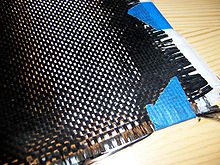
Back مادة مؤلفة Arabic Kompozit material Azerbaijani Композитен материал Bulgarian Compòsit Catalan Kompozitní materiál Czech Defnydd cyfansawdd Welsh Komposit Danish Verbundwerkstoff German Composite material English Kompozita materialo Esperanto

Composite materials are made from two or more basic material. They are not just placed together. They are merged together. This create a material with useful properties unlike the individual elements.
The composite material as a whole may behave differently from either of its parts. For example, reinforced concrete (made of concrete and steel) has resistance to pressure and to bending forces. Bullet-proof glass (made of glass and plastic) is far more resistant to impact than either glass or plastic on their own.
Concrete itself is a composite material. It is one of the oldest man-made composites, used more than any other man-made material in the world.[1]
Wood is a natural composite of cellulose fibres in a matrix of lignin.[2][3] The earliest man-made composite materials were straw and mud combined to form bricks for building construction. This ancient brick-making process was documented by Egyptian tomb paintings. It is still used today in some places.
Fibre-reinforced polymers are in wide use today, as is glass-reinforced plastic.

The Biblical book of Exodus tells of the Israelites that were oppressed by Pharaoh and forced to make "bricks without straw".[4]
- ↑ Lomberg, Bjorn 2001. The skeptical environmentalist: measuring the real state of the world. Cambridge University Press, p138. ISBN 978-0-521-80447-9
- ↑ Hubbe M.A. & Lucia L.A. 207. The love-hate relationship present in lignocellulose materials. Bioresources. 2, 534.[1]
- ↑ Hon, David and Shiraishi, Nobuo (eds) 2001. Wood and cellulose chemistry. 2nd ed, New York: Marcel Dekker.
- ↑ The old brick-making process can still be seen on Egyptian tomb paintings in the Metropolitan Museum of Art.[2] Archived 2007-10-25 at the Wayback Machine.